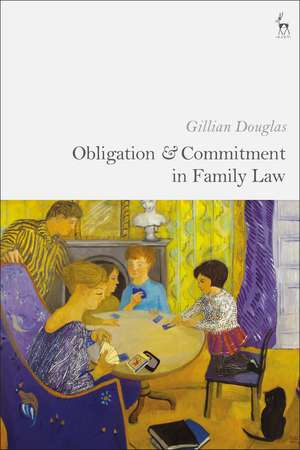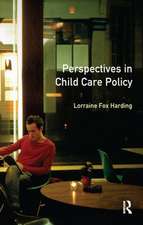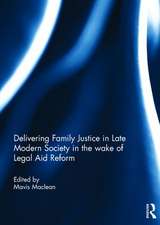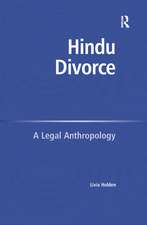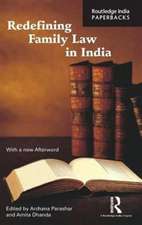Obligation and Commitment in Family Law
Autor Professor Gillian Douglasen Limba Engleză Paperback – 19 aug 2020
| Toate formatele și edițiile | Preț | Express |
|---|---|---|
| Paperback (1) | 271.86 lei 6-8 săpt. | |
| Bloomsbury Publishing – 19 aug 2020 | 271.86 lei 6-8 săpt. | |
| Hardback (1) | 542.02 lei 6-8 săpt. | |
| Bloomsbury Publishing – 18 apr 2018 | 542.02 lei 6-8 săpt. |
Preț: 271.86 lei
Preț vechi: 348.76 lei
-22% Nou
Puncte Express: 408
Preț estimativ în valută:
52.02€ • 55.63$ • 43.37£
52.02€ • 55.63$ • 43.37£
Carte tipărită la comandă
Livrare economică 17 aprilie-01 mai
Preluare comenzi: 021 569.72.76
Specificații
ISBN-13: 9781509940288
ISBN-10: 1509940286
Pagini: 304
Dimensiuni: 156 x 234 x 21 mm
Greutate: 0.42 kg
Editura: Bloomsbury Publishing
Colecția Hart Publishing
Locul publicării:London, United Kingdom
ISBN-10: 1509940286
Pagini: 304
Dimensiuni: 156 x 234 x 21 mm
Greutate: 0.42 kg
Editura: Bloomsbury Publishing
Colecția Hart Publishing
Locul publicării:London, United Kingdom
Caracteristici
This book offers a new perspective on policy forms and future developments in family law.
Notă biografică
Gillian Douglas is Executive Dean and Professor of Law at The Dickson Poon School of Law, King's College London.
Cuprins
1. The Ties that Bind? I. Introduction II. Care and Caring III. Legal Obligation IV. Obligation as a Social Norm VI. The Rationale for Obligations Upon Family Members VII. Obligation or Commitment 2. Family Change and Individual CommitmentI. Family Changes II. A Demographic Picture III. From the Family to the Individual IV. Change and Commitment 3. To Have and To Hold I. Compelling Cohabitation II. The Concept of Consortium III. The Suit for Restitution of Conjugal Rights IV. The Modern 'Duty' of Cohabitation V. Marriage as Personal Commitment 4. A Clean Break I. A Duty to Maintain II. Maintenance During Marriage III. Post-Divorce Maintenance and the Clean Break IV. Triumph of the Clean Break? 5. Can't Pay? Won't Pay! I. Duty to State, Mother or Child? II. Limiting the Burden on the State III. Protecting the Position of Mothers IV. Supporting the Child V. A Culture of Non-Compliance 6. Parenthood is for Life I. Obligation or Right? II. Paternal Right and Maternal Concession III. A Right of Both Parents IV. A Right of the Child V. A Parental Responsibility VI. Enforcing Contact VII. A Presumption of Continuing Parental Involvement VIII. An Obligation to be 'Involved'? 7. Who Cares? I. Care-Giving as an Obligation II. Care-Giving as a Claim to a Remedy III. Caring Relationships IV. Recognition of Caring Relationships, or Recognition of Care? 8. The Law of Family Obligations I. Care, Obligation and Commitment II. Altruism, Family Obligation and Non-Justiciability III. The Gendered Legal Approach to the Family Unit IV. Obligations and Commitments in Family Law V. Obligation and Commitment
Recenzii
Douglas provides an insightful overview of the changes in family demography and their impact on family law, which presents a good snapshot of the radical transformation to social life in the UK... Overall, the book is clearly presented and well written. It is essential reading for family law scholars.
There are many different ways in which one can approach this subject, and individual preferences will vary. The one chosen by Gillian Douglas has yielded many insights and also allowed a masterly exposition of relevant law. It is a most valuable addition to the literature.
Douglas concludes this fascinating book by highlighting, first, her original observation about the ill-fit of emotion and personal commitment within the legal domain and second, the way in which modern law's celebration of individualism and individual emotional fulfilment has tended to favour men and not women or children... Douglas's arguments are compelling and her analysis offers family lawyers a way of understanding both the successes and failures in reform of family law and policy over the last century.
There are many different ways in which one can approach this subject, and individual preferences will vary. The one chosen by Gillian Douglas has yielded many insights and also allowed a masterly exposition of relevant law. It is a most valuable addition to the literature.
Douglas concludes this fascinating book by highlighting, first, her original observation about the ill-fit of emotion and personal commitment within the legal domain and second, the way in which modern law's celebration of individualism and individual emotional fulfilment has tended to favour men and not women or children... Douglas's arguments are compelling and her analysis offers family lawyers a way of understanding both the successes and failures in reform of family law and policy over the last century.
